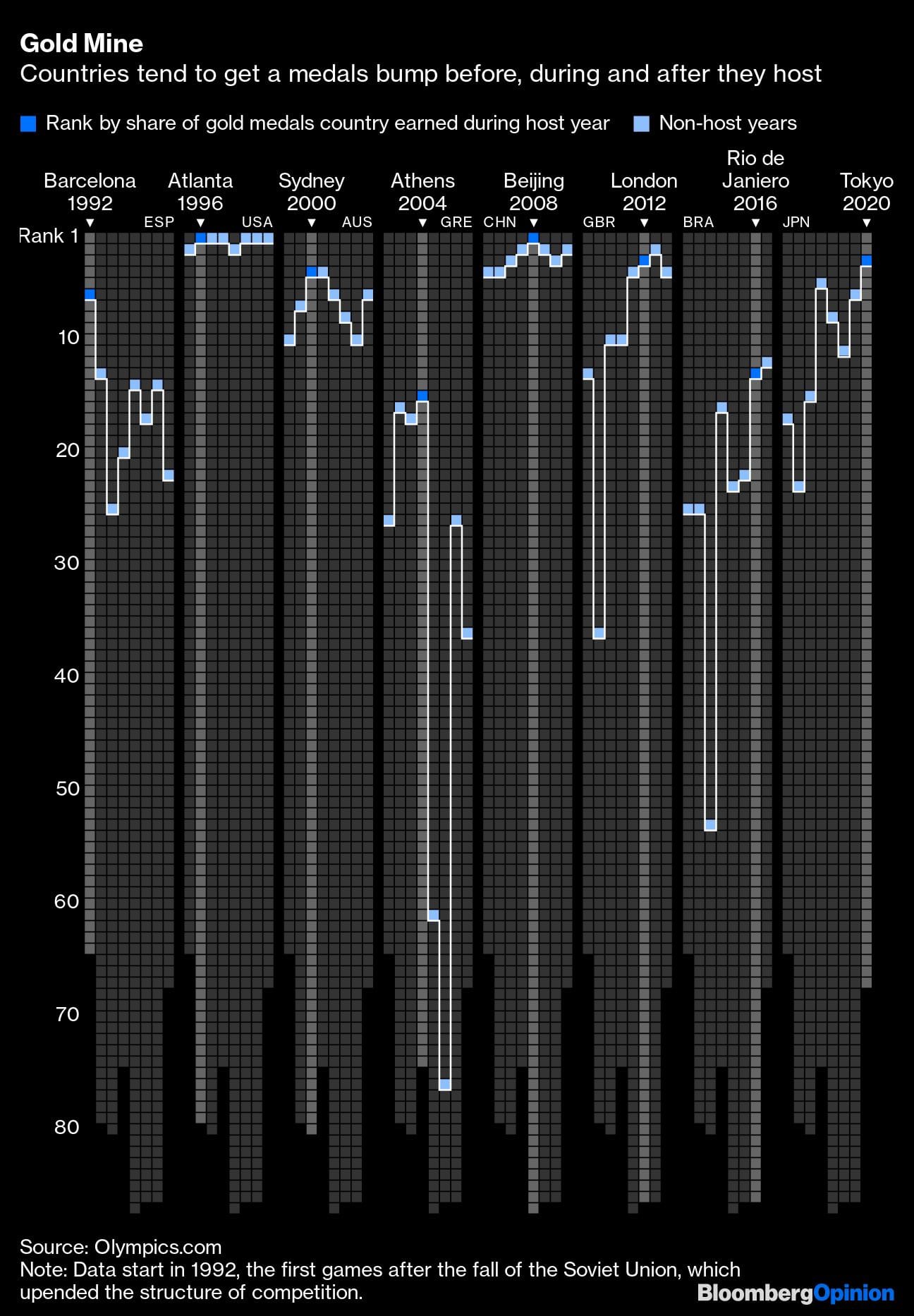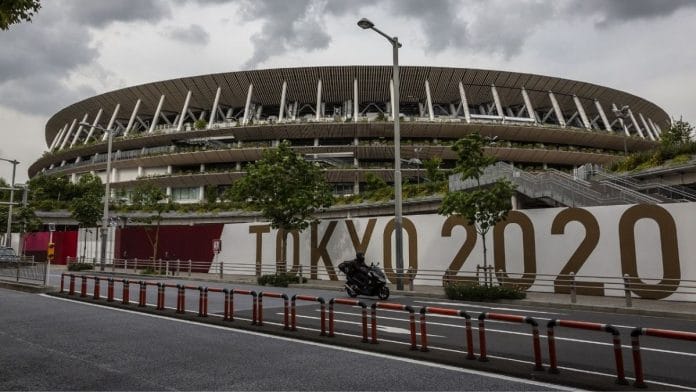Hosting an Olympic Games is an economic disaster, even in non-pandemic times. After more than a century and over 50 installments, there are enough case studies to conclude that the home nation is invariably the biggest loser from the world’s largest sporting event.
Except in the medal tally.
A look at the count of gold, silver and bronze shows that the host country gets a significant boost, one that persists in subsequent games.
Japan’s incredible haul for Tokyo 2020, with 27 gold medals, puts it third behind the U.S. and China. Significantly, it captured the top prize in 7.9% of all events on offer this past fortnight. That compares with 3.9% in Rio 2016 and 2.3% for London 2012. Rankings, by tradition, are based on first prizes. This year, the U.S. topped the tally with 39 gold and a total of 113, ahead of China at 38 and 88, respectively. Japan’s 58 overall rounded out the nation’s most successful games.
This isn’t a one-time phenomenon. An analysis of all Summer Olympics held from 1992 through 2021 shows that the single most powerful driver of medal tally, particularly gold, is hosting the event, and how many years since a country last did it. We start from Barcelona games because they were the first after the end of the Cold War. The Soviet Union — a sporting powerhouse — was broken into numerous independent states, including Russia, that are collectively and individually weaker, making comparison with earlier editions invalid.
Doubtless there are numerous contributors to performance, including institutionalized support for athletic programs, access to facilities and coaching, and illegal, performance-enhancing drugs. But the data indicate that the best way to boost results is to enjoy the home-ground advantage.
We can see that a country does very well during what are called its Golden Games as host, and that strength persists in the following Olympiad, its Silver Games. Japan is no stranger to this idea. The country ranked third at home in 1964, behind the U.S. and the USSR, with 16 gold medals.
Spain’s Golden Games at Barcelona in 1992 saw it grab 5% of the gold on offer, putting it sixth. Australia jumped from 3.3% in its Green Games (the event prior to hosting) to 5.3% at Sydney 2000, climbed to 5.7% four years later in Athens, then slid slightly to 4.6% at its Bronze Games in Beijing.

Hosting was a boon for Greece, the spiritual home of the Olympics, grabbing the top spot in six events in 2004 and climbing to 15th from 17th in the rankings, but then dropped to zero gold in 2008. A similar tale plays out for Brazil: from 1% before hosting to 2.3% in Rio de Janeiro, then 2.1% this year in Tokyo. With an almost-clean sweep of events such as skateboarding, Japan, like host nations before it, has enjoyed a certain level of home-park advantage.
There’s little to suggest any connection between Olympic and economic performance. Andrew Zimbalist, an economist at Smith College and author of multiple books on the topic, concludes that cities holding the event lose money. He suggests having a permanent host to ameliorate the cost. Tokyo’s losses are likely to be compounded by Covid-19, which led to a ban on foreign tourists and shut sporting venues to crowds. A recent estimate suggests that the cost doubled from initial expectations to $15.4 billion, including an additional $3 billion due to the one-year delay and related pandemic-control measures.
On the flipside, economic data don’t suggest any correlation with medal count. Being rich doesn’t hurt, with the U.S. consistently near the top. China’s increasing wealth over the past 30 years to become the world’s second-largest economy has coincided with its increasing share of medals. But then consider that Japan is the third-largest by gross domestic product and has placed as low as 23rd in the past three decades. Germany and India are the next largest, and their Olympic performances show divergent tales.
Nor is medal performance explained by GDP growth. China has expanded along with its sporting might, yet Vietnam’s incredible rise since 1990 comes with minimal improvement in athletic results. The Southeast Asian nation’s economy posted phenomenal expansion between 1990 and 2020. Its team of 18 didn’t manage a single medal in Tokyo, after first winning gold only five years ago, in shooting. Other fast-growing economies like the Maldives and Ghana have never stood atop the podium. Population doesn’t correlate with performance, either (India, Indonesia and Pakistan all lag), nor does GDP per capita. Luxembourg, Singapore and Qatar are rich and have few medals between them.
As Japan and its aging population of 126 million look back on these most troubled of games, economists will again be noting the financial folly of a nation’s decision to play host. But at least more Japanese athletes than ever have worn gold and might enjoy the afterglow in Paris, where the French can test their own home-nation chances for Olympic glory.-Bloomberg
Also read: Ministers to Hockey India, all are quiet on casteist attack on Dalit player Vandana Katariya






